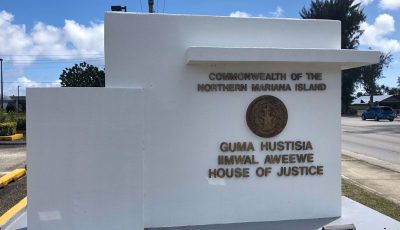Woodruff ‘tired of litigating disciplinary cases’ against him
»Seeks disqualification of disciplinary counsel Clifford
Attorney Stephen Woodruff has stated that he’s quite tired of litigating the disciplinary cases that led to Superior Court Associate Judge David A. Wiseman’s order in June 2013 for his disbarment from the practice of law in local courts.
Woodruff appeared before CNMI Supreme Court Associate Justice Perry B. Inos on Wednesday for a hearing on his motion that seeks to disqualify disciplinary counsel Thomas Clifford from the disciplinary matter that he is appealing.
After listening to Woodruff’s and Clifford’s arguments, Inos placed the matter under advisement.
At the hearing, Woodruff, argued that Clifford should be disqualified from the case and that a new disciplinary counsel be appointed. He said this is a complex case that involves a lot of issues.
“I’m not a perfect attorney,” Woodruff said in concluding his arguments when Inos informed him that his time was up.
Woodruff said the issue is not untimeliness to file his pleadings in court but Clifford’s refusal to recuse from the case.
Woodruff said he likes Clifford, whom he described as a good lawyer, and that he does not like to ask for the recusal, but that in this case it is necessary.
In opposing the motion to recuse, Clifford said they had a lengthy discussion before Wiseman about the same issue of his representation for the NMI Bar Association. He said Woodruff was unable to point a single fact that warrants his recusal.
Clifford said he is not interested in this case and that he believes no one from the Bar is interested to serve as disciplinary counsel and prosecute a fellow lawyer. As a Bar member, though, he has a duty to do so, he said.
Clifford said Woodruff did not object to his representation when the disciplinary case was heard in Superior Court.
“There has to be a timely objection to my representation,” Clifford said, pointing out that Woodruff raised his objection 13 to 14 months later. He said Woodruff waived his objection by not timely raising the issue.
Clifford said the underlying issue in the disciplinary case is Woodruff’s untimely filings. He said Woodruff needs some kind of system to manage his private practice and that it makes no sense to remand the matter to the Superior Court.
In his disbarment order on June 7, 2013, Wiseman found the lawyer to have 44 violations of the Model Rules of Professional Conduct.
In an interview after the hearing, Woodruff said his motion requests that briefing be stayed, that Clifford be disqualified, and an appeal conference officer be appointed.
Woodruff said the court denied the appointment of an appeal conference officer and denied the stay of briefing.
He said the issue heard was his motion to disqualify Clifford.
Woodruff said he never argued that disqualification of Clifford should be retroactive and mean that everything that happened in the Superior Court gets automatically set aside just because of his conflict of interest.
Woodruff said he wants an attorney that is not conflicted, that will deal with the case in accordance with the prosecutorial duty and not have his perceptions followed “by whatever it is that follows Mr. Clifford perceptions in this case.”
Woodruff said Clifford argued that he’s asking for some kind of special break.
“No. I did not ask for any kind of special break. I only asked that he treat that case the same way that he would treat an ordinary case. As a prosecutor his duty is actually tightened,” he said.
Woodruff cited that they had that order of distribution that included the $600 payment to Kenneth and Wanlapa Warfle, one of the nine cases in the disciplinary matter.
Woodruff said he has no problem with the $600 being paid to the Warfles, but the Warfles have to fulfill their side of the settlement agreement if they’re being paid.
He said the record with regard to the order of distribution was very clear and in all of the previous proceedings.
First of all, he said, the money was put in to the court in trust and not to be disbursed.
Woodruff said what everything Clifford did with regard to the order of distribution is wrong, “but the court did not want me to talk about that.”
He said it’s the reason why Wiseman on July 3 withdrew the order of distribution because it’s actually wasn’t proper.
“It’s Mr. Clifford who prepared that order and the first name to be paid in that order is $600 to the Warfles, without the Warfles ever signing the agreement, without the Warfles ever officially notifying the court and the disciplinary committee that they are withdrawing their complaint,” he said.
Woodruff said they had a hearing on his motion to disqualify and then Clifford chose to try to use the hearing as an opportunity to argue his motion to dismiss the appeal.
“Mr. Clifford is trying to turn around and try to push the court…’never mind the motion to disqualify, dismiss the appeal,’” he said.
Woodruff said the bottom line is, if the appeal is dismissed, he’s denied due process.




























